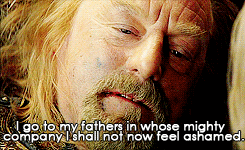Fighting the Long Defeat: Lessons From Tolkien for Times of Social Decay
My recent talk at the Academy of Philosophy and Letters
This past weekend I was in DC for the annual meeting of the Academy of Philosophy and Letters. This was my third time at the meeting, and the first as a member. The theme this year was “Picking Up the Pieces: Rebuilding a Viable Culture”. As usual, I had a very nice and spiritually refreshing time seeing old friends and making new ones.
APL is a rather small and intimate gathering of intellectuals ranging from teachers, clergy, and writers to professors that emphasize the primacy of culture in social change and preservation. But beyond that, given the state of the contemporary world today, it goes beyond merely another intellectual meeting. Rather, I tend to view it as a gathering of the faithful Numenorians working to keep our civilization from being sunk into the sea by the hubris of the faithless hordes. Here is a conference where people are able to speak freely about the state of the world among those of like mind who seek to do something about it.
APL is looking to increase attendance, and I encourage anyone with interest to contact me about attending next year’s meeting. I will post about it as the details come out in the months ahead.
Here was my talk:
Fighting the Long Defeat: Lessons From Tolkien for Times of Social Decay
The general atmosphere of more or less all aspects of American society today is one of decline. All of the key pillars of society are in a state of dysfunction and disarray. The state grows ever larger while simultaneously more incompetent, the economy is rife with cronyism, malinvestment, and wasteful financialization, religious organizations are in sharp decline, and the family and birthrates continue to collapse. Not to mention, many of our elites and political leaders seem to think that waging a proxy war on the other side of the globe against the state with the largest nuclear arsenal is not only a great idea, but also far more important than addressing the pressing issues that are crumbling here at home.
None of this really needs elaborated on in present company, and we are not gathered here this weekend to grumble about how everything is going to hell, but rather to figure out what to do about it.
Today I will not really be recommending any specific course of action when it comes to fixing this problem or that, but rather I will note three different approaches or reactions to the present crisis that I have seen among those who are ostensibly not leftists and contrast these with Tolkien’s concept of fighting the long defeat and some of what that entails.
Desertion From Reality
The first reaction is simple desertion from reality.
Today work rates for prime age men (25-54) are lower than they were in early 1940 when the Great Depression was happening and unemployment was 15%.
Nicholas Eberstadt at AEI notes that "For every prime age guy who's unemployed, there are over four who are neither working nor looking for work. We have this unworking army of over 7 million prime age men in the United States today." He also notes that about half of them use pain medication every day.
Millions of men have looked at the state of the world and basically decided it is not worth dealing with and instead spend their days in a haze of TV, pornography, video games, and drugs.
It seems that technological innovations will likely make this all worse in the years to come, as virtual reality, and the extreme content customization provided by AI increasingly make the virtual world far more seductive and appealing than dreary problem filled real life.
As I touched on in my presentation last year, the Japanese are in some sense ahead of the curve here and have two useful terms for the situation. First is NEET. Not employed, educating, or training. And many NEETs are what the Japanese would call hikikomori, that is shut-ins who largely live off of their parents and are unable to deal with reality. To see a depressing inside picture into the minds of turn-of-the-millenia hikikomoris one can read the novel Welcome to the NHK by Tatsuhiko Takimoto.
Alternatively, to see some artistic renderings of where we seem to be headed, one can watch the anime Darling in the Franxx, which depicts a futuristic world in which nearly all of humanity has undergone a medical procedure to become immortal that as a side effect renders them sterile. Most people spend their days in tubes that stimulate the pleasure centers of their brains.
A similarly bleak picture is painted in the video game and anime Cyber-Punk 2077, where vast swathes of the population use drugs and spend their days hooked up to pornographic brain dances that let them vicariously experience carefully crafted sexual experiences without leaving their home.
(Just days after this talk Apple announced its new VR headset.)
Will To Power
The second response is pure unadulterated will to power. Seeing the disorder and chaos, these people have simply decided that all our problems can be solved by acquiring power and wielding it against our enemies.
There are various manifestations of this response, with some notable figures including integralists such as Sohrab Ahmari and Adrian Vermeule, as well as Mencius Moldbug aka Curtis Yarvin and strange neo-pagan figures of the alt-right, such as the pseudonymous Bronze Age Pervert, who in actuality is Costin Vlad Alamariu, a Straussian who received a PhD in philosophy from Yale with a dissertation called “The Problem of Tyranny and Philosophy in the Thought of Plato and Nietzsche” where he argues that in the Gorgias Plato was esoterically arguing that Callicles was correct.
The Blackpill
And finally the third common response is the Blackpill. This goes beyond the apathy of mere desertion to the conclusion that all hope is lost, and at the extreme end killing oneself, which is perhaps the ultimate form of deserting reality.
Tolkien and the Long Defeat
In contrast to these three reactions, I would argue that there is a better way to face the current troubles and those that surely lie ahead, and that is the mindset of Tolkien’s long defeat.
Tolkien was no stranger to hard times and things going wrong and his fantasy work echoes that. Things start to go wrong from the second page of The Silmarillion and they stay wrong until the end. All of Tolkien’s legendarium can be summed up in the words of Galadriel that “together through ages of the world we have fought the long defeat".
Tolkien’s work is suffused throughout with this spirit of defiance in the face of seemingly perpetual calamity, and while we could go on about the subject for hours and hours, I will focus on Tolkien’s rebuttal to the three above-mentioned approaches.
You will note that I identified the first response as being desertion from reality, rather than escapism. This is intentional, as in his essay On Fairy-Stories Tolkien states that escapism is one of the main functions of fantasy.
Fantasy is an act of sub-creation as befitting of our status as beings made in the image of the Creator. When it is done well, it conveys high truths about the world that have become obscured by the drab circumstances we find ourselves in. For a brief moment, we are able to transcend this fallen world and to glimpse a taste of eternal truths.
Truths perhaps best expressed from the end of the most reprinted editorial in the English language “Yes, Virginia, there is a Santa Claus” published in 1897 when Francis Church remarks:
You tear apart the baby’s rattle and see what makes the noise inside, but there is a veil covering the unseen world which not the strongest man, nor even the united strength of all the strongest men that ever lived could tear apart. Only faith, poetry, love, romance, can push aside that curtain and view and picture the supernal beauty and glory beyond. Is it all real? Ah, Virginia, in all this world there is nothing else real and abiding.
Tolkien accuses critics of fantasy of having seemingly confused escape, however brief it may be, from our fallen state and desertion, asking “why should a man be scorned if finding himself in prison he tries to get out and go home?”
What’s more, Tolkien continues, “Not only do they confound the escape of the prisoner with the flight of the deserter; but they would seem to prefer the acquiescence of the ‘quisling’ to the resistance of the patriot. To such thinking you have only to say ‘the land you loved is doomed’ to excuse any treachery, indeed to glorify it.”
Tolkien fully realizes that circumstances are glum. But he does not seek to escape responsibility, rather, the prisoner escapes from the enemy to continue on the fight.
In contrast, millions of Americans have in effect deserted in the face of the enemy. On some level they recognize the direness of the situation, and hence are attempting to avoid it. But rather than transcending the circumstances, they slump into ever deeper despair and try to forget by drowning themselves in liquor, drugs, and entertainment.
We shall return to the deserters later, but for now let's move on to those who have embraced the will to power.
Tolkien clearly addresses those who embrace the will to power, most notably in the character of Saruman who concludes that it is pointless to resist the forces of darkness, which conveniently provides an opportunity for unchaining any semblance of inhibitions. In Saruman’s words “We must have power,” “power to order things as we will, for that good that only the Wise can see.”
It is notable here that the power Saruman craves is the singular centralizing power of the one ring. Power is indeed necessary to accomplish anything, but it is most safely and naturally manifested not singularly, but separately among the diverse institutions of society.
While Tolkien is explicitly clear that the Hobbits, especially Sam, are the heroes of the story, contemporary would-be Saruman’s openly deride Hobbits, sometimes literally, as in the case of Curtis Yarvin’s essay “You Can Only Lose the Culture War” where he states that the Hobbits need to stand aside and leave politics to the “right people” which conveniently includes him.
In his excellent essay “Why Are Liberals Pretending to be Racist” Malcolm Kyeyune makes a convincing argument that much of the so-called online dissident right, ranging from Bronze Age Pervert to the hosts of the Red Scare Podcast are little more than over-produced elites attempting to carve out their own niche of power, the actual people and policies on the line be damned.
As noted above, any treachery can be excused by doom mongering.
However, ultimately, Saruman is brought down, not by a mighty elf bedecked in shining armor, but by the humble Hobbits who scour the Shire of Saruman and his filth.
Finally we come to the blackpill.
The most obviously blackpilled character in Tolkien’s work is Denethor, who performs the ultimate act of desertion and kills himself in the face of the enemy.
Denethor’s downfall stems from his misplaced trust in his own wisdom. As Tom Shippey notes, “Denethor is cleverer than Theoden, knows more, is more civilized, and perhaps more intelligent: but he is not wiser… He looks too far into the future, and misinterprets what he sees. Above all, he trusts in his own chains of logic.”
Denethor’s intellectual hubris is symbolized in his use of a Palantir, a seeing stone that allows him to see far off places and into the future. However, Denethor, just like Sauron and Saruman when they consult the seeing stones, is shown something that is true without context and is misled. Believing that Sauron has reclaimed the One Ring, he kills himself in despair.

In contrast to Denethor is Theoden. He also thinks that things are grim and probably hopeless. But unlike the deserters, he does not just roll over and die. Rather than trusting in the hubris of his own perceived knowledge he instead holds to honor and desires to live up to the glory of his ancestors.
Ultimately, this faith is at the core of fighting the long defeat. We do not know what is going to happen, but we may strongly suspect that all of our efforts shall be for naught. But this does not stop those who wage the long defeat from doing what is right.
The Hobbits, notably Pippin and Sam, suspected from the beginning that the whole quest would be a disaster, yet carried on with the infantryman’s slogan of “look to your front” and had no expectation other than to do the duty that had been laid upon them.
It is easy to look into the future and despair. It seems that things are headed from bad to worse. Indeed, thanks to the power of AI and advances in genetic engineering we may soon face literal hordes of orcs in the form of Chimeras birthed in artificial wombs in Chinese labs.

Yet, one does not even need to be a Christian to fight the long defeat. As Tom Shippey notes in reference to Ragnarok, Northern mythology offers “no heaven, no salvation, no reward for virtue except the somber satisfaction of having done right”.
However, for those of us who do believe, the end beyond sight is far less gloomy. As Tolkien noted in a letter “I am a Christian, and indeed a Roman Catholic, so that I do not expect 'history' to be anything but a 'long defeat' – though it contains (and in a legend may contain more clearly and movingly) some samples or glimpses of final victory.”
We do not know what lies in store for us on this earthly plane, but we can continue to trudge on knowing that, in the words of Hurin at Nirnaeth Arnoediad, the Battle of Unnumbered Tears, “Aure Entuluva”: Dawn shall come again.
We need not fall into despair, though the world be engulfed in darkness. Ultimately we know that at Dagor Dagorath, when Morgoth breaks through the walls of night, Eärendil shall descend from the heavens, the hosts of Arz-Pharazon shall emerge from purgatory, and “then shall the Last Battle be gathered on the fields of Valinor. In that day Tulkas shall strive with Morgoth, and on his right hand shall be Eönwë, and on his left Túrin Turambar, son of Húrin, returning from the Doom of Men at the ending of the world; and the black sword of Túrin shall deal unto Morgoth his death and final end; and so shall the children of Húrin and all Men be avenged.”
The eucatastrophe achieved, we, and all the children of Iluvater, shall participate in the second music of the Aiunur and Arda shall be remade.
But until then, let us vow to look to our front and close with a toast Tolkien delivered in 1958: I look East, West, North, South, and I do not see Sauron; but I see that Saruman has many descendants. We Hobbits have against them no magic weapons. Yet, my gentlehobbits, I give you this toast: To the Hobbits. May they outlast the Sarumans and see spring again in the trees.”






